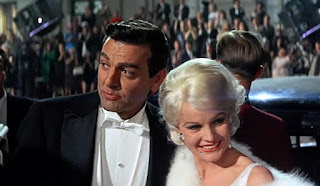 |
| Mike Connors and Carroll Baker |
HARLOW (1965). Director: Alex Segal.
"All the best things in life have to be done alone" -- "Marie Dressler" in Harlow II
In 1965 there were two "dueling" biopics about the star Jean Harlow, who died tragically young at 26, but neither of these films give the actress her due. Right off the bat, it seems like unfair competition, as Harlow I is a technicolor, widescreen epic with the highly publicized Carroll Baker [The Carpetbaggers] in the lead. Harlow II stars the perhaps lesser light Carol Lynley [The Shuttered Room], and was essentially a black and white television production (shot in Electrovision) and blown up to theatrical proportions. The chief difference, among many, is that Baker plays the role so that Harlow comes off as fresh and appealing, while Lynley is in "big bitch" mode throughout most of the movie, making one wonder why anyone would want to work with her. Harlow's mother is played in the first film by a marvelous Angela Lansbury, and Ginger Rogers is also quite good as the mother in Harlow II. In both films Harlow has a shiftless Italian stepfather, Marino. Raf Vallone [A View from the Bridge] is excellent as the character in the first film, while Barry Sullivan, despite not being Italian, manages to score in the second film as well. Both movies are rather slanderous (by 1960's standards as well as 1930's) in the character of first/second husband Paul Bern, who appears at least to be impotent and, it is suggested, homosexual. In the first film Peter Lawford barely registers, while a superb Hurd Hatfield [The Picture of Dorian Gray] gives the best performance in either picture as the same character. Bern had a common law wife who is never seen in the first film, and is played quite well by Audrey Totter in the second; she tells Harlow's mother that although she is Bern's mistress, they have never had physical contact. In both pictures Harlow is so dejected/depressed by the Paul Bern business that she turns herself into a "slut." Harlow I is based on a bio by Irving Shulman that was found by subsequent biographers to be heavily fictionalized. Unfortunately, Shulman's version of Harlow and her circle seems to be the unofficial basis for the second film as well.
 |
| Carol Lynley as Jean Harlow |
As for the leading ladies, both give competent if second-rate performances (especially in the case of Baker), with both failing to capture the essence of Harlow -- her voice, her attitude, that surly, sexy, lovable demeanor that made her so famous. The ladies do the best they can, but as both versions say over and over again, there's only one Jean Harlow. [Both movies fail to get across that Harlow was a good actress.] An unintentionally comical scene occurs at the end of Harlow I when the doctor administering to a very ill Harlow exhibits as much compassion to her mother as a sociopathic iceberg. Oddly, the doctor in the second film is similarly cold, if not quite so stone-faced. In Harlow I Baker/Harlow disgustedly smears cold cream all over her image in her mirror, a scene that also occurs in the earlier Queen Bee with Crawford.
Verdict: Two smutty movies that don't have that much to do with the real Harlow. Both versions: **1/2 out of 4.
4 comments:
Bill, thank you so much for this wonderful, detailed comparison of two very different films about the same subject--made in the same year. Reminds me of the year that we had a spate of Truman Capote biopics, and the next year duelling Hitchcock bios...
I have seen both of these movies, and you have aptly pointed out the best and worth of both. Of course, I prefer the glossy, overblown, technicolored version with the manufactured glamour of Carroll Baker (a promising actress who got pigeonholed as a sex symbol). In fact, I own the DVD of this silly film, it has a LOT of campy moments and some fabulous Edith Head gowns and Sydney Guilaroff hairstyles!
The Lynley version is written and filmed very much like a TV soap opera, in black and white, and Lynley does a good job, though neither Baker no Lynley capture Harlow at all. In fact, in both these films it is Marilyn Monroe's ghost that is evoked strongly (especially in the Baker fillm). Marilyn had died a couple years before, and her untimely death and stormy life was reminiscent of Harlow's. It is said that Marilyn herself was developing a Harlow screenplay before she died in August 1962.
Both Lynley and Baker are still with us. Would love the TCM Film Festival to honor them some day (soon!!)
Your blog always gets me excited, Bill, now I need to see these again--for the umpteenth time!
-Chris
Enjoy! The black and white version is probably still on youtube.
I am familiar with the picture "Hitchcock" starring Anthony Hopkins -- do you know the name of the other one about Hitch?
I've ordered a Jean Harlow bio that will hopefully get all the facts straight about her life, Paul Bern, and so on. You're right that these two films definitely had a Monroe "mystique."
The other Hitchcock film is called The Girl, centering on his obsessive relationship with Tippi Hedren. Toby Jones played Hitch and Imelda Staunton was His wife Alma. I recommend it!
Thanks! I'll look for it.
Post a Comment